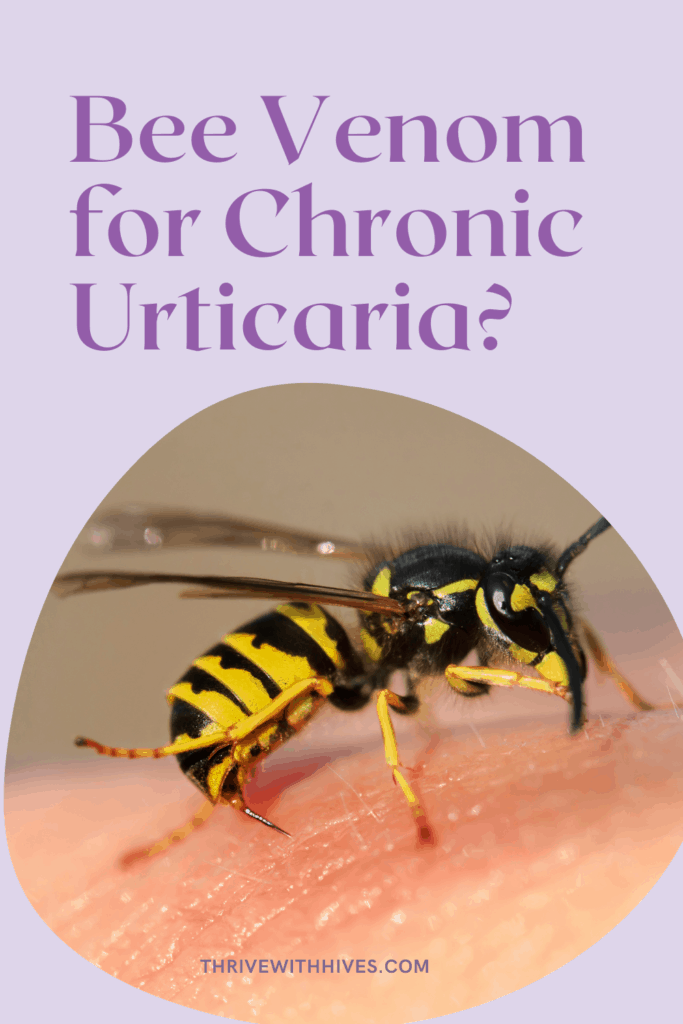Can Bee Venom Help Relieve Chronic Urticaria?
Bee venom has been used as an alternative treatment for inflammatory, allergic, and immune disorders. Could bee venom help Chronic Urticaria Symptoms?
The past few weeks have been hectic. We moved from metro Detroit to rural West Virginia. My diet has not been good with hours of car rides and keeping myself super busy with the baby and packing and cleaning. I have been eating junk food and, of course, experiencing a ton of stress—the perfect recipe for a hive flare.
On one of our trips, I forgot to pack my medications. I dreaded the night as my hives tend to peak in intensity, and I was fully expecting to flare considering my state of health these past weeks.
To my surprise, the hives never came. I was shocked. I thought, “did they go away on their own as the doctor had promised over a decade ago?
No. My symptoms came back the following evening with a vengeance.
So why did I not have hives that one night despite abusing my body?
A bee sting. That’s all that I could think of that was new. I had been foolishly traipsing around the overgrown field in a dress the day before, and a bee got stuck in my boot. The bee, of course, stung me.
I was intrigued by this phenomenon and hit the internet to see if this could have possibly affected my Chronic Urticaria symptoms.
I could not find anything about hives being relieved by bee stings, but I found that bee venom may be used as a therapy for some autoimmune and inflammatory conditions.
So I wonder, could been venom be used as a therapy to prevent chronic hive flares?
I am not a physician and nothing on this blog should be taken as medical advice. This is a general overview from my own research. As always you should check with your physician before making any changes to your treatment plan.

If you have an allergy to bee venom, obviously this alternative remedy should be skipped or consult your allergist.
What is bee venom therapy?
Bee venom therapy, also known as Apitherapy, is a natural alternative treatment found to help reduce the symptoms of some inflammatory conditions such as arthritis.
Due to its use in traditional medicine practices for thousands of years, Apitherapy has recently experienced a surge in popularity. The bee’s venom is used in various ways and can be found in many forms, including creams applied topically or taken internally through pills made from honeybee larvae.
You can now find bee-venom products like moisturizers, lotions, and lozenges on the internet or in specialty stores. Meanwhile, injections of live bees can be administered by healthcare professionals to alleviate chronic pain. A “bee venom acupuncture” method uses honeybees for therapeutic purposes by placing live bees onto your skin to sting you.
Potential Benefits of Bee Venom
Scientists are not all in agreement about the benefits of bee venom, but it is clear that there’s something magical to these little creatures. According to some studies, they have powerful medicinal properties and can be used for various purposes, from anti-tumor agents to pain relievers.
Bee venom therapy isn’t without its flaws. Scientists debate whether or not these natural compounds are worth the potential health risks.
Anti-inflammatory
One of the most well-documented benefits of bee venom is its powerful anti-inflammatory effects. The main component, melittin, has been shown to reduce inflammation in small doses but can cause itching or pain when delivered in high amounts.
Pain relief
This study demonstrates how bee venom therapy has been used as successfully as other treatments to improve outcomes in rheumatoid arthritic patients.
This study shows that when used in conjunction with other therapies, those who received bee venom therapy experienced a significant improvement in their symptoms.
Anti-aging
This study shows that bee venom serum applied topically can reduce the appearance of wrinkles after eight weeks. Who doesn’t want that?
Bee venom has an impressive ability to stimulate collagen production, which helps create elasticity in the skin and decreases wrinkles.
Clinical trials have shown that bee venom increases collagen protein synthesis by encouraging new cell growth of healthy skin tissue, reducing the appearance of damage on your face.
Already a natural heal-all for so many things, it’s no surprise bees can help you look young again too!
This article shows that bee venom may be beneficial for multiple other skin conditions as well. Bee venom therapy has shown positive results in psoriasis, acne, Scleroderma, Alopecia, Melanoma, Atopic Dermatitis, and Vitiligo.
The skin benefits alone have sent me to Amazon to try some topical bee venom serum!
Immune Health
Studies have shown that bee venom therapy may help treat autoimmune conditions and allergic diseases such as asthma, leading to promising results.
This study summarizes how bee venom could be beneficial for autoimmune, neurological, and allergic disorders.
This article suggests that bee venom therapy could be a potential complementary treatment for COVID-19.
Is there any risk involved with using this treatment?
Despite its many benefits, bee venom therapy doesn’t come without potential risks.
The venom from bees can cause serious side effects or even death in highly allergic individuals by causing anaphylaxis (a potentially life-threatening reaction that makes it hard to breathe).
Other adverse reactions have also been documented, including hyperventilation, fatigue, changes in appetite, vomiting, increased bleeding, and extreme pain.
In this study, nearly 29% of participants experienced adverse effects.
Here is a news report about a woman who died due to bee sting therapy after two years without reactions.
Here is another article that outlines the dangers of the practice.
5. Should you consider bee venom therapy?
Like anything to do with your unique health situation, the decision to use bee venom therapy is up to you and your care team.
If you would like to consider bee sting therapy, after researching the potential benefits as well as risks, I recommend discussing the subject with your allergist/immunologist.
For now, I will be sticking to the topical serum. The pain and potential adverse reaction are enough to deter me from asking someone to sting me with bee venom. It is an exciting concept but we need to keep risk vs benefits in mind. Is the risk of death worth the potential benefit? Not for me.
Knowing that bee venom may have these benefits will take some of the negativity out of getting stung by bees for me. But for now, I will let nature decide when I get stung.
What are your thoughts on bee venom or sting therapy?
Interested in learning about other natural remedies for hives? Check out this article outlining 15 natural remedies for hives.
